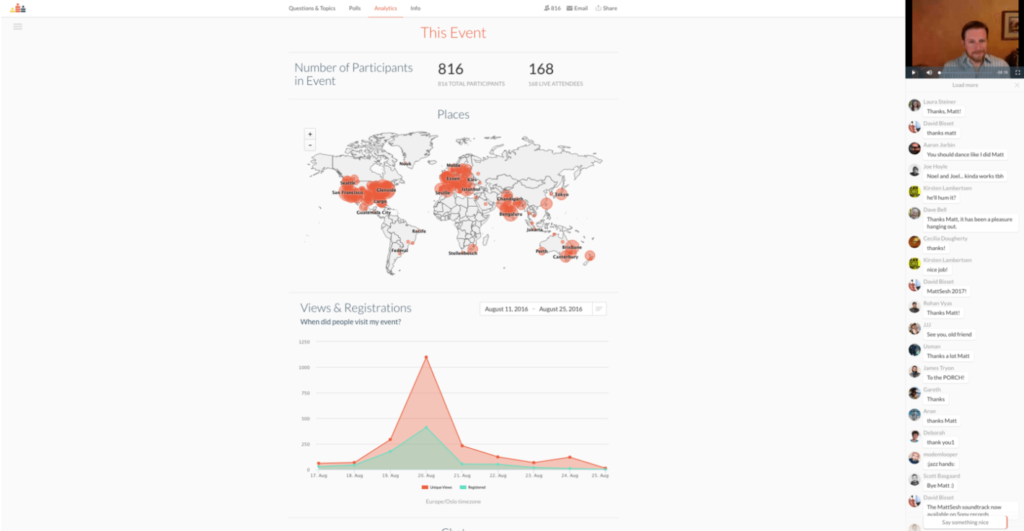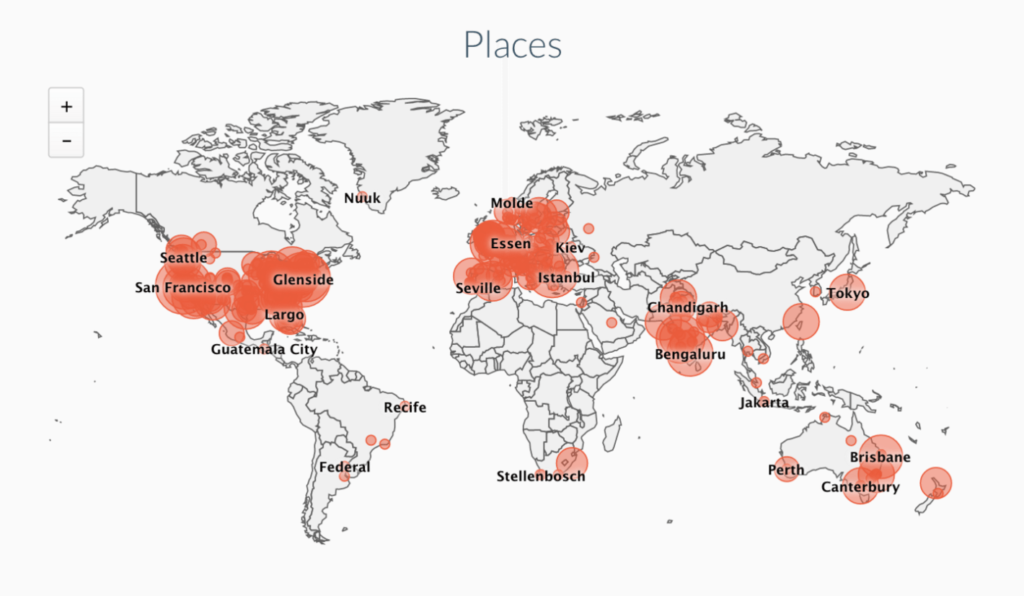Over the weekend, WordPress professionals from around the world sacrificed sleep and sanity to tune into the fourth annual WordSesh. The 24-hour streaming conference, which was held entirely online, kicked off on Saturday at 8 p.m. ET. WordSesh featured one session every hour and included speakers like Matt Mullenweg, Petya Rayovska, and Brent Shepherd presenting on a range of different topics:
- WordCamp Europe and the Global WP Community by Petya Raykovska and Paolo Belcastro
- 10 Step Guide to doing your own thing (with WordPress) by Kimb Jones
- Introduction to WooCommerce Development by Brent Shepherd
- WordSesh Chat with Matt Mullenweg by Matt Mullenweg
All sessions were recorded and are currently available to on Crowdcast.
By The Numbers
The event has been viewed by 816 people to date, with an average of 100 unique viewers at any time during the 24 hours.
According to the most recent data provided by co-organizer Scott Basgaard, WordSesh brought in viewers from around the world, spanning across five continents. The top five countries being,
- USA
- United Kingdom
- India
- Australia
- Canada
The top five cities with the largest number of viewers are as follows:
- Brisbane
- New York
- London
- Bengaluru
- Pune
The top five most viewed presentations were:
- Matt Mullenweg – https://www.crowdcast.io/e/wordsesh4/21
- Noel Tock and Joe Hoyle – https://www.crowdcast.io/e/wordsesh4/22
- Brian Krogsgard – https://www.crowdcast.io/e/wordsesh4/14
- Brent Shepherd – https://www.crowdcast.io/e/wordsesh4/20
- John Blackbourn – https://www.crowdcast.io/e/wordsesh4/17

Hurdles
Wordsesh this year changed the format in which the presentations were streamed. According to Basgaard, the first two years were done with Google Hangouts on Air and YouTube embeds. WordSesh 3 was made up of Google Hangouts and Crowdcast, and WordSesh 4 was held entirely on Crowdcast.
This was both good and bad for the event. In the past, the presentations were streamed in one system and the chat took place in another. Though this allowed users to watch from any device, it was difficult for organizers to manage each presentation. Crowdcast allows chat and presentations to be done in one location however it can only be viewed from a desktop.
Crowdcast also requires registration. According to Basgaard, these two factors may have contributed to the dip in numbers from previous years. Though that may be the case, 816 people is nonetheless significant, and will continue to grow as people view the recordings.
“It’s really amazing to see such a diverse crowd join around the world in so many different timezones to engage and participate in digesting WordPress knowledge and engage in discussion,” Basgaard said. “Every year we continue to try and improve our platform for a better experience for both our organizers, speakers and users watching.”
The team is working on centralizing the presentations from every WordSesh event on YouTube and iTunes audio to create an archive of WordPress material accessible to everyone.
Presenter Experience
WordSesh is an excellent forum to learn, engage, and come together to talk WordPress. Moreover, it is the perfect event for folks who haven’t had the opportunity to attend a WordCamp due to geographic or financial barriers. It’s also a great place to get acquainted with WordPress and the community.
WordPress developer David Bisset, who presented a talk on WordCamps, felt that the experience was even more low key and personable than attending a conference.
“I think there’s a lot less pressure than speaking at a WordCamp, at least in my experience,” Bisset told Torque in an interview. “The interactive quality of giving a talk while people are talking in a back channel can be distracting for some, but I find it quite enjoyable.”
WordSesh is also incredibly valuable as it removes accessibility barriers encountered at WordCamps. Not only does this make the event more easily accessible to viewers around the world, but it also opens up the opportunity to capitalize on accessibility to speakers.
“I would however, strive do better in inviting new speakers to WordSesh, especially those who maybe need that extra gentle push to speak at WordCamps,” Bisset said. “There is no requirement for WordSesh that says you must be a former speaker. Perhaps I can play a role of being a “sponsor” or “assistant” to increase the diversity of topics and speakers for a future event.”
WordSesh 4 was a huge success and if you missed anything make sure to catch the recordings online.
Did you attend WordSesh? What is your feedback? Let us know in the comments below.


No Comments